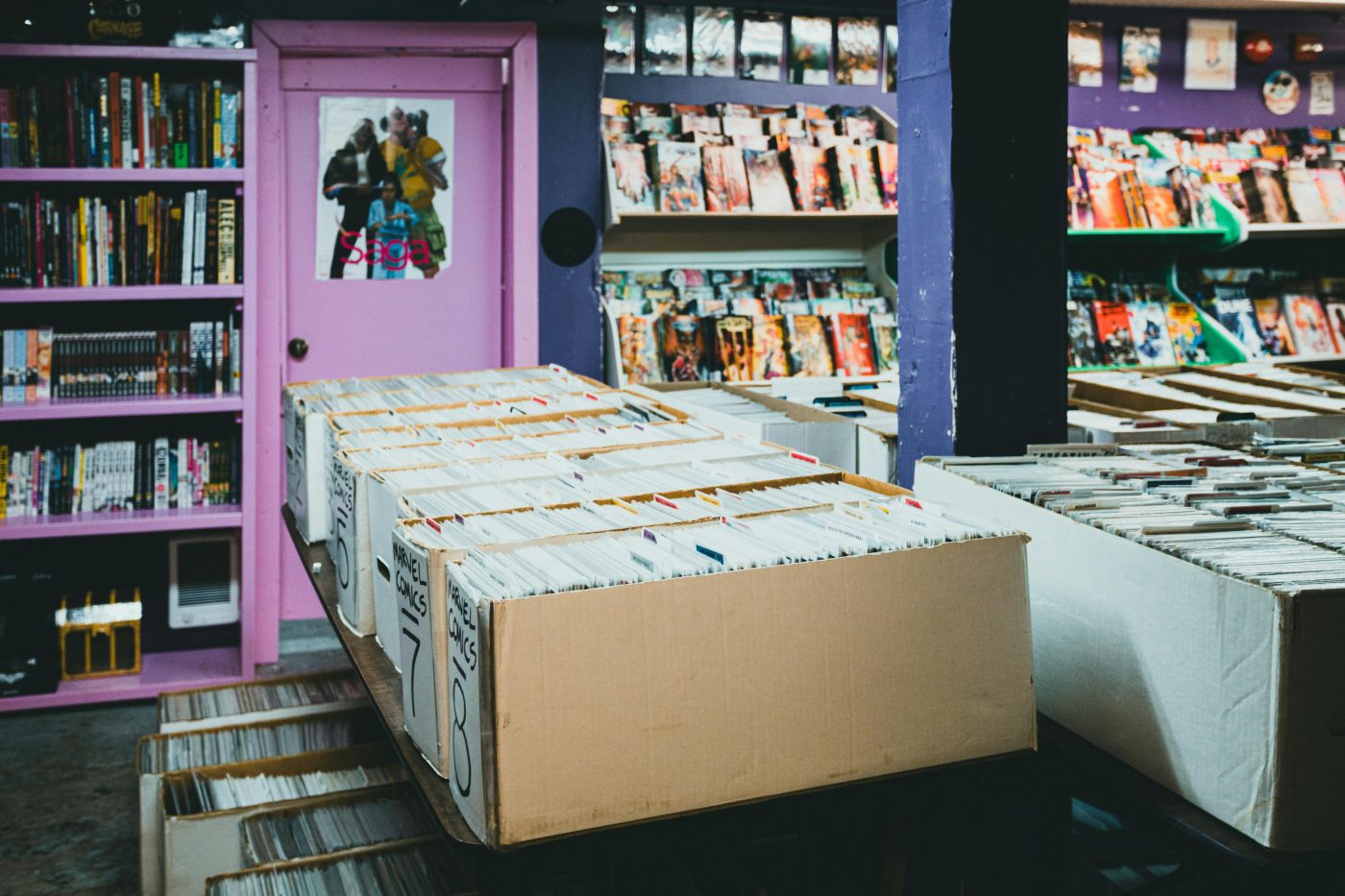
In our latest series on tariffs for The Comics Journal, I talked to forty-five comics stores about how they’re weathering this year’s financial changes and upsets. Between rising tariffs, havoc in distribution, and general cultural shifts, it’s been a wild year for retailers so far.
As we learned in TCJ’s last piece on tariffs, books and comics are exempt from tariffs (which, in short, has to do with a carve-out in the tax code for free speech). But are comics stores still affected by tariffs?
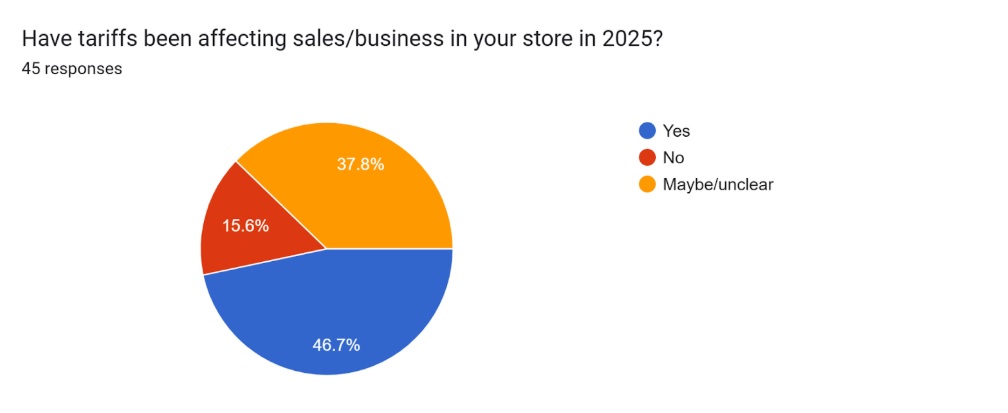
Only 15% of stores that I talked to told me that tariffs weren’t affecting their business at all.
“We only sell books and comics, so the answer is ‘basically no impact at all.’ Bags and boards got more expensive, mostly,” said Brian Hibbs, owner of San Francisco’s Comix Experience.
That’s the case for Kendall Swafford, from Up Up & Away! in Cincinnati, Ohio, as well. “I have to admit, [thus far] the effects have been minimal at worst," he said. "Both spending and foot traffic are up over 2024, and our customer base seems confident in their personal situations going forward. We were proactive and stocked up on products we thought might be affected, such as China-manufactured collecting supplies, enough to get us through most of the rest of the year. We've not been forced to raise prices at all as a result of tariffs, but we'll reassess when the time comes to place new orders.”
Some stores reported that tariffs were affecting their business, but in a relatively minimal way.
Benn Ray from Atomic Books in Baltimore, Maryland, said, “We see no direct evidence that tariffs are affecting our sales of books, comics, zines, and mini-comix yet. However, we have carried a lot of art toys/blindboxed toys and other ephemera. We're expecting tariffs to hit those (a few distros/manufacturers have already said they're raising prices), so we've been pivoting away from them. But so far it isn't anything that's core to our identity, so it's been fairly easy to move away from it.”
For many stores that predominantly carry comics and graphic novels, sales are proceeding unchanged.
Dave Pifer, from Secret Headquarters in Los Angeles, California, said, “I'm not sure that tariffs have really affected the books and comics that we currently carry. I don't know if any of our regular publishers (domestically or internationally), from Silver Sprocket to Fantagraphics to Marvel, have pushed back their schedules or put any titles on pause. Nobody seems to be publicly announcing the direct effects to their output.”
And that’s the case for international stores with a similar inventory as well.
“For us, we have no trouble at all, because we mainly sell comic books, manga, and books nowadays. Concerning merch, for sure it’s quite a problem since in recent years the European Union is applying heavy tariffs to U.S., U.K., Japan and China imports. After so many past tariffs, this trouble is no longer a problem because eventually we pivoted to a comic book store mainly focused on comic books, manga, and books, with a very small merch section,” Jesus Marugan, of Akira Comics in Madrid, Spain, said.
Many retailers are still tracking the effects as potential changes slowly roll out.
“So far, it hasn't been too bad,” Rob “Friar” Tuck, from Friar Tuck’s Comics & Collectibles in Boston, Massachusetts, said. “I stocked up heavily on items that I thought would be tariffed, so I'm thanking my previous self! I have seen a little downturn in overall comic business, but cards remain strong.”
Jeremy Shorr, from Titan Comics in Dallas, Texas, said, “I honestly haven't seen enough rise in prices to notice it. A little bit in comic book supplies but overall fairly invisible from my store's perspective.”
Things are similar for Patrick Browner of Challengers Comics + Conversation in Chicago, Illinois. “Prices for comic book supplies have gone up, with some suppliers literally adding a tariff surcharge (but then they lowered it when the tariff percentages changed)," he said. "And while we hear rumblings about some publishers thinking about raising prices (mainly on collected editions and graphic novels), nothing has really happened yet.”
“We have yet to be charged any tariffs for the comics we sell, but I believe that will change soon. Penguin Random House now invoices us with each item's country of origin,” said Jim Turoczy, from Eide’s Entertainment in Pittsburgh, Pennsylvania. Those invoices may be a sign of a distributor preparing for future tariff costs.
“Tariffs have not affected us yet ... obviously that’s a bit of a moving target,” said Patrick Shaughnessy from Golden Age Collectables in Vancouver, B.C. “All the distributors are just warning me — everyone’s assuming it’s going to happen, but nothing’s happened yet.”
Cliff Biggers, of Dr. No’s Comic & Games in Marietta, Georgia, is seeing potential tariffs as an incentive for change. "We have adjusted slightly on a few things — mostly comics supplies — but are also using tariffs as a motivator to dump moribund product lines like Funko Pops. We used tariffs as a reason to analyze sales data and it made it easy to see what was already in decline and remove that from our orders.”
But some stores that work directly with local independent publishers and creators are seeing tariffs affect costs already.
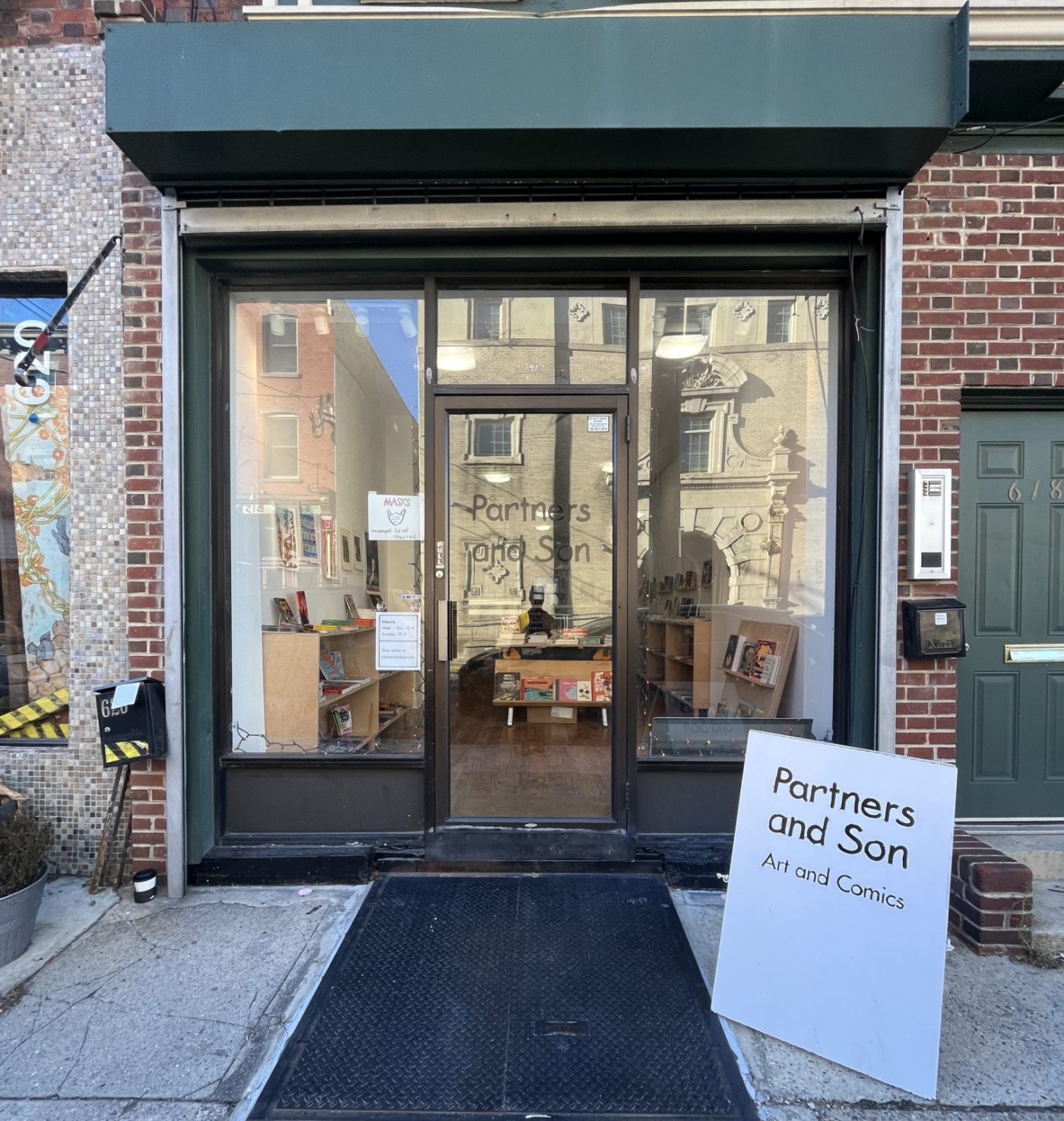
Gina Dawson, from Partners & Son in Philadelphia, Pennsylvania, said, “The rising costs of printing for small and self publishing are making the retail costs higher, general anxiety of everyone affecting their ability to make their work (we work directly with a lot of artists).”
The same is true for Allison Jenkins, of Comic Envy in Asheville, North Carolina, who told me, “Paper pricing will rock my industry, and most of our printing is in Canada.”
“One of my local comic publishers doubled the cost of their comics,” said Scott Thorne, of Castle Perilous Games and Books in Carbondale, Illinois.
The increased tariffs on bags, boards, and plastic sleeves for comics have significantly affected a number of retailers.
Erin Tapken, from Alter Ego Comics in Marion, Iowa, said: “I can't eliminate offering comic book supplies, but I will [have] to evaluate their cost with each shipment and adjust when necessary. Unfortunately I have already lost several supply customers because of the ongoing supply chain issues that leave me without products for too long. Those customers still get their comics from me, but now get supplies from Amazon.”
That issue is also affecting Edward Greenberg, from Collectors Paradise in Los Angeles, as well. He said: “The only easily measurable way we have been affected is the price of cardboard and plastic supplies, and even here it's unclear if prices for those have gone up, or if suppliers padded prices in anticipation of changes that have not materialized.”
James Frazier, of Cyborg One in Doylestown, Pennsylvania, said that, “Mercifully, the only tariff that hit us directly was on a BCW comic book supply order. They hit us with a $300 tariff charge on a $1500 order, but I really don't understand how that order wasn't placed on inventory that was sitting in the warehouse pre-tariff, so frankly, it reeks of cynical gouging on their part.”
The drastic and immediate rise in prices from BCW was something I heard about from a number of retailers.
For example, John Dudas of Carol and John’s Comic Book Shop in Cleveland, Ohio, said that, “Products from BCW supplies, specifically bags, had a 34% tariff charge added to our wholesale invoice.”
Jen King from Space Cadets Collection in Shenandoah, Texas, is seeing the same thing in her store. “The things we have seen affected immediately were supplies and imported collectibles," she said. "We were told by the companies that we were using for things like bags and boards (already at record costs that never went down after the hike in prices during covid on all things plastic and cardboard) that prices were going to hike up again. ... It's meant that we have spent extra money reserves trying to put additional stock of these items away at as close to pre-tariff prices as possible.”
These supplies have been a major pain point for many retailers, in some cases causing havoc.
“Most comic supplies (bags for the most part) are made out of this country, be it Canada or China. It’s caused huge delays because of the tariffs," said John Robinson, of Graham Cracker Comics, which has stores in Illinois, Wisconsin, and California. “Perhaps this was all a clever game of chicken and it will all be worth it in the long run, I can't say. But for right now, it's nearly impossible for a shop to budget and plan for six months down the road and keep their inventory flowing properly (turnover is everything, but if I don't have the product to sell, I can't turn anything).”
That point about difficulty planning ahead was something I heard about from retailers across the board.
“The Trump Tariffs are impacting our member stores in a variety of ways,” said Marc Bowker, Director of Outreach at ComicsPRO and owner of Alter Ego Comics in Lima, Ohio.
I reached out to Marc to ask about ComicsPro’s overall perception of the state of comics retail around the U.S. As the trade association for comics stores, they keep their fingers on the pulse of what’s happening in the retail space. "The common theme is that [tariffs have] created a high degree of uncertainty. Uncertainty for retailers not knowing what the tariffs will be from week to week. Uncertainty for our suppliers who have to project much further out because of production times. And uncertainty for the customer facing rising costs for nearly all consumer goods.”
Kim Hoang, from Librairie Crossover Comics in Montreal, Quebec told me: “The back-and-forth nature and randomness of the application has caused a lot of confusion. The general discouragement that our customers felt meant that they were cutting their pull lists, and being a lot more discerning about their choices. We definitely see a lot less impulse shopping, though we managed to communicate to our folks to go heavier on pre-orders ... for our sanity and theirs too.”
“Initially, the tariffs caused an increase in prices of products I was ordering for my shop. Then the tariffs were paused, so prices didn't go up. Then they were unpaused, paused, and unpaused. It just causes a lot of uncertainty because each time a price goes up or down, I then have to go and adjust prices in my inventory system,” said Eli Roberts of Adventures in Ink in Leander, Texas.
He also saw customer confusion over tariffs. “Additionally, the tariffs caused some panic buying among my customers who decided to forgo comics, games, and toys, and they spent their money on electronics and other things trying to beat the price increases from the looming tariffs," he said. "I had several customers tell me they were cutting back in anticipation of higher prices for other things.”
Erik C. Jones of Four Color Fantasies in Winchester, Virginia said that tariffs “haven't affected us much yet, but I'd like to specify YET. We're almost strictly comics, which haven't been hit yet. If we carried more games or pops then we would definitely be feeling it more. All of that being said I'm worried every day that President Dipshit will ruin something and we'll get screwed.”
The uncertainty has caused major business shifts for some retailers.
John Riley, from Grasshopper’s Comics in Long Island, N.Y. said, “The main impact of tariffs at this point is that we can't make any investments in the business going forward as we have no idea what our cost of sales for product lines are going to be. We'd like to bring in new paint lines, but will they be subject to a 10% tariff or a 154% tariff? Like many businesses, we are pretty much frozen in time right now. We can't make any decisions as there is zero certainty. I think that lack of spending is what is going to slow the economy ultimately. I'm not willing to risk my money when the president can wipe out that investment on a whim. We were actually planning on opening another business, but we have cancelled those plans entirely as a result.”
“I have scaled back on periodical orders and focused more on GNs and TPBs," said DC Harbold, from More Fun Comics in New Orleans, Louisiana. I’m spending much more time organizing and filing back issues and back stock, and promoting comic runs from previous years. I anticipate but have no proof of new product going up in cost. I imagine the cover prices will remain the same but could see my discount becoming lower to absorb the cost of new product,”
“It has really thrown a wrench into consistency, pricing, and budgeting,” Jon Engel, from New Dimension Comics in Pittsburgh, told me. “Where to get Pokemon and not have my orders slashed by 70-80%? Where will I get toys with Diamond's fate in the air? Will Universal carry toys? Will the margins be any better with Universal than they were with Diamond? Will my customers continue to spend or will something else happen in the world that causes them to reprioritize their spending? Lots of things right now are going on and none of it is great.”
Holly Burrows of The Cartoon Museum in London, U.K., said, “The majority of our online shop sales overseas were to the United States. Since the tariffs have been brought in, I haven't made any sales to the U.S. The majority of the items people buy from us are made in China, so this also impacts the tariffs. I have also had emails from distributors saying that they may not be able to ship to America anymore.”
It’s not just costs going up for some retailers. “Prices have increased for our goods, and because of this, we have had to halt our rewards programs,” said Anthony Lakes, from Derby Comics & Games in Shelbyville, Kentucky.
Ralph DiBernardo of Jetpack Comics and Games in Rochester, N.H., said that, “The hardest part is trying to determine what the ‘current’ pricing is. From distributor to distributor the percentage of the tariff can be significantly different. Some distros have the price factored into the item while others tack it on at the end. The biggest change for us is that we are NOT buying in bulk until things shake out. Normally we would place large orders for supplies. Now it's small weekly increments.”
And even small, daily inconveniences due to tariff uncertainty are adding up for stores.
“It's unclear what the actual tariffs are and what's affected. It seems to change on a day-to-day basis. We haven't seen a change in the discounts we receive from distributors, but cover prices do seem to have increased on comics and graphic novels. It's unclear if that's just a general trend, or if it's tariff related,” Jared Myland of OK Comics in Leeds, U.K., said. “The constantly moving parts of the comic industry are definitely a concern. If tariffs are going to affect us we can react, we can decide how many to order, what price to charge, etc. But the current state of flux means we often don't know which publishers are available from which distributors. Just buying in stock has become much more labor intensive.”
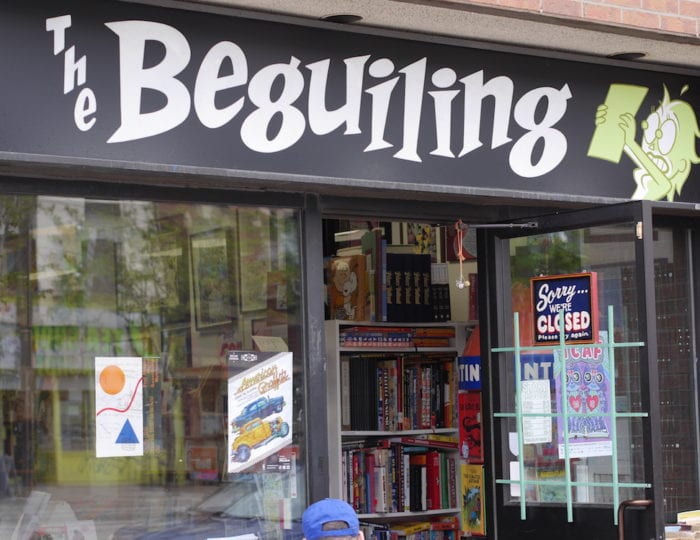
The same is true for Peter Birkemoe, from The Beguiling in Toronto, Ontario, who said that, “Almost nothing we sell is tariffed as yet (either US or Canadian) but the uncertainty around them has increased our workload.”
“I believe what's impacting comic retailers more than the tariffs themselves is the volatility and uncertainty about the future,” said Kate deNeveau, from Hello Comics in Charlottesville, Virginia, who also serves on the ComicsPro board as Recording Secretary and Director of Operations. “We're concerned about distribution challenges, the survival of small publishers, and our customers' financial stability. Manufacturers and distributors can raise wholesale prices — and do — more easily than we can adjust the MSRP on our products. That said, I'm relieved the situation isn't catastrophic for my shops at least, and there's no need to panic about the state of the industry. Billy Joel would have a heart attack trying to fit all the chaos we've endured over the past five years into one song.”
“I just want one week where there isn't a massive shake-up at the distribution level or some new tariff appearing out of the blue,” said Tripper Pech, from House of Heroes Comics in Oshkosh, Wisconsin.
It's the stores that sell more than just comics that are seeing direct effects from the tariffs.
“Tariffs have seriously impacted the gaming side of my business," Jennifer Haines of The Dragon in Guelph, Ontario, said. "Both Magic and Pokemon are being tariffed crossing the border into Canada, and all board games are being tariffed coming from China to the States. Game companies are choosing to produce less or delay production, and the reduced velocity, coupled with higher costs are not easy to weather. The book and comics market hasn't been impacted yet, and at the end of the day, my sales are higher than they have been in years. But I'm not sure how sustainable that is on the gaming side, where product is so expensive.”
“The biggest change for us has been our collectibles," Jake Motsinger of Memory Lane Comics in Wilmington, N.C., said. "We sell a large amount of toys, from inexpensive keychains and trinkets, to premium Hot Toys and statues. All of our distributors for these items have increased prices by 10-20%, causing us to have to sort out how to best deal with this with customers, especially those that pre-ordered items at a certain price. The uncertainty on future pricing is causing us to rein in orders on everything and put us closer to ordering to quickly sell out instead of ordering to grow our business.”
John Hendrick, from Big Bang Comics in Dublin, Ireland, said that the timing for these materials has affected his store’s sales as well as the tariffs. “The biggest impact has been suppliers not sticking to scheduled release dates. We are receiving stock out of order, before and after scheduled release dates," he said. "In terms of toys we are getting stuff sent to us thick and fast, from one supplier we are receiving all of July and August's releases in one day next week, so we will have about eight weeks worth of orders arrive, putting us and customers under financial pressure. We were also given two days’ notice that this would happen. Basically suppliers are trying to send us everything they can before tariffs kick in at any time.”
Randy Grace of the Maroon Hornet Comics and Collectibles in Oxford, Pennsylvania, said, “The biggest negative impact to our small town shop is the high minimum order requirements for free shipping on games and TCG games like Magic: the Gathering and Pokemon. Walmart and big box stores have the purchasing power.”
With tight margins, some stores are looking to stop carrying these items completely.
“I have slowly been drifting away from low-margin items that are made overseas, like action figures and other non-paper goods. Alter Ego's Erin Tapken said. "I can't eat the increase in costs and also compete with big-box stores who have hundreds of thousands of other items they can make it up on. There is no room for loss leaders in my store.”
Rather than seeing an effect on individual comics, graphic novels, or board games, a number of stores are instead seeing their customers become more cost-conscious.
“So far tariffs are only affecting the cost of Magic: the Gathering and Pokemon, though they haven't really affected sales of those products," Kerri Neal, from Downtown Comics in St. John’s, Newfoundland, said. "I found there was a chill on overall consumer spending when it was in the media a lot in the spring, but people seem to have forgotten about it.”
“Inflation has been part of all our lives for the past four years. That, along with the rising minimum wage, has forced us to examine our margins weekly,” Brendan Boyle of The Collective: A Comics & Game Community in Altamonte Springs, Florida, said.
Other stores are worried about future consumer spending.
“My fear is that when new prices start to kick in the next few months as the tariffs are more reflected in the supply chain, that consumers will get a price shock somewhere and begin to cut back on everything, and comics obviously aren't a necessity,” Grasshopper Comics' John Riley said.
"Our biggest concerns are not with the comic book industry (even if ongoing crumbling of the old order continues) but with the larger world,” said Pech of House of Heroes. “Our business thrives on the impulse buy, or on disposable income. The less of that customers have, the less they are going to want to buy. Up until now, it feels like everyone has just swallowed the tariff and inflation pill and accepted it as our current reality. If it keeps going, I worry that customers will just not have the funds to spend on entertainment as freely as they have the last few years.”
In some cases, however, the current economy is already causing a significant change in store profits.
“I have noticed customers holding back some and being more looky-loo than shopping,” Trent Walsh of BaT Comics & Games in Chico, California, said.
Comic Envy's Allison Jenkins is seeing the same thing in her store: “I am just finding customers are just broker because EVERYTHING is more expensive than they are used to.”
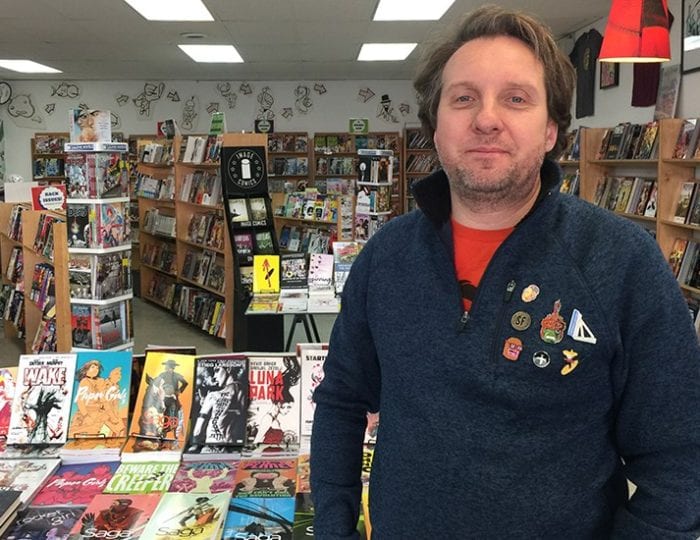
“I am seeing slower graphic novel sales, but it's difficult to determine why that's happening," Leef Smith of Mission: Comics & Art in San Francisco, California, said. "Prices have been creeping up, but also I feel since the pandemic the more casual reader is even more inclined to make their book purchases online especially here in San Francisco.”
“I'm worried about effects of the Trump administration spiraling out and more and more negative impacts being felt by more and more people, and more and more impactful distractions from the regular patterns on consumption and people enjoying their lives," he added. "The last Trump presidency had a very real negative economic impact on my store, especially in 2017.”
“The real issue we see is the intentional devaluation of the dollar by the Trump administration,” Benn Ray of Atomic Books said. “We import a lot of art books, comics (shockingly there is a dearth of American publishers of underground/alternative comic books), zines, journals, etc. And the weakening dollar has already made these prices jump. It limits our purchasing power, and it makes books more expensive for consumers. So as a purchaser, I have to ascertain the price point where customers may be less likely to take a risk on a strange European import. So for those kinds of things, prices are going up, I'm ordering fewer copies, and I'm ordering more cautiously.”
“In general, people are being much more cautious with their discretionary spending,” Gina Dawson of Partners & Son in Philadelphia concluded.
But tariffs are only one of the major industry challenges that comics stores are facing right now. I asked stores if tariffs were currently their primary concern: the vast majority of stores said no, and cited other issues, including Diamond’s bankruptcy.
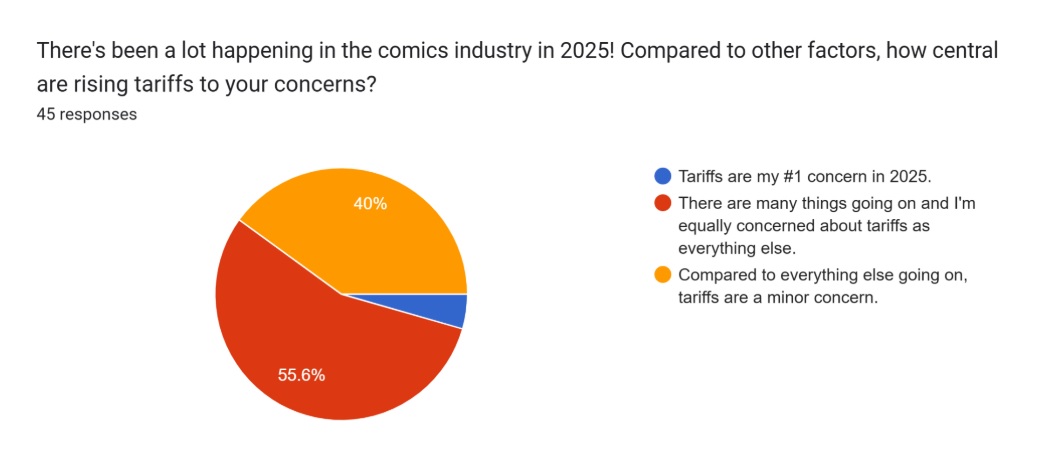
Several retailers told me that the effects from the bankruptcy were causing serious problems for their business, on both the large and small scale.
Rob Tuck of Friar Tuck’s Comics & Collectibles said, “The dissolution of the Diamond subscription service, the Pullbox, will be a MAJOR problem and cost me and my staff a TON of time. That's my #1 concern right now with tariffs being #2. If Universal Canada gets DC exclusively and our clueless President decides to place tariffs there it will be a HUGE problem and cause lots of stores to shut down or stop carrying DC/new comics. Ugh.”
“The bigger issues by a mountain are the distributor issues. Things seem to be on an even keel for getting the new stuff for almost everyone, but the smaller publishers are the ones who are really going to suffer,” Golden Age Collectables' Patrick Shaughnessy said. “For Marvel and DC I’m not having any trouble getting back stock, but for Image I am.”
“The fracturing and splintering of the distribution system has been the biggest issue,” Calum Johnson of Strange Adventures Comix & Curiosities in Halifax, Nova Scotia, told me. “Trying to source products from ever-changing suppliers — that’s extra time for inputting orders on several platforms.”
“Loss of Diamond's standardization of data, series and product codes is going to be the biggest problem going forward, not tariffs," Edward Greenberg of Collectors Paradise said. "The distributors running the game now need to RUN not walk towards the new ... standard. We have a month or two to fix things and get onboard before data is unmanageable, especially if Universal starts shipping products.”
“We've been open forty-three years now so we've been through a LOT of changes in this industry,” said Graham Cracker Comics' John Robinson. “I, like many other retailers, longed for the day when I would have other choices than having to rely on one single distributor. ... I should have been more careful in how I worded my wish, as it came true. I hated having one monopoly to buy from, and because I did not word my wish correctly, I was granted three monopolies to buy from and still no competition.”
And some comics stores are concerned about the up-and-coming comics distributor Lunar.
“The scariest thing to me is being forced to do more business with Lunar, a distributor that is also our biggest retail competitor. They devalue the price of comics at retail and are constantly gaining data that can be used to market their store to our customers,” said Memory Lane's Jake Motsinger.
Also on retailers minds: getting good data and Point of Sale (POS) systems, which stores use to track their orders, inventory, and sales.
“We are frustrated because the lack of clarity and guidance on the situation (ie, no clear communication/presented plans from many distributors) lost us some sales regardless," Kim Hoang of Librairie Crossover Comics in Montreal, Quebec said. "It's a little wild west right now, we're hoping some new champions show up—especially regarding Point Of Sale systems, and reliable and streamlined data from distributors and publishers.”
Still, most stores see a positive future for the comics retail industry, even if it’ll take some time and effort to get there.
“I'd love to see things calm down a bit once most of the publishing and distribution fires are put out,” Secret Headquarteres' Dave Pifer said. “Then maybe everyone can turn their attention to trying to make things work better in every area of the comics industry.”
“Running a comic shop has always been a battle that has been worth fighting. Almost every comic shop in North America is an independently owned small business," Charles Boyer of Geek Out in Burleson and Mansfield, Texas, shared. "We do it because we love the medium."
“Our customers seem very excited about comics and graphic novels right now, in a way that feels very much driven by friend recommendation, and open to chatting about what the staff loves and trying it out, and being very engaged in the community of collecting," Space Cadets' Jen King said. "So many young people, too. The future of comics has new life in them.”
There are exceptions to the positivity, though.
Jim Turoczy of Eide’s Entertainment in Pittsburgh said, “I expect only the strongest comic shops to survive in the coming years.”
The post Tariffs are affecting comic book stores, but not in ways you might expect appeared first on The Comics Journal.

No comments:
Post a Comment